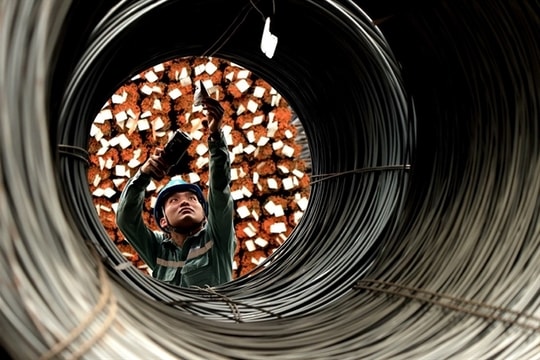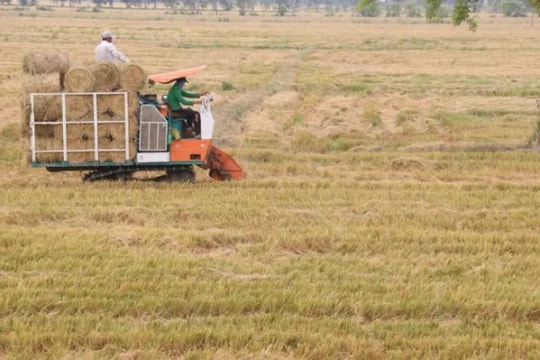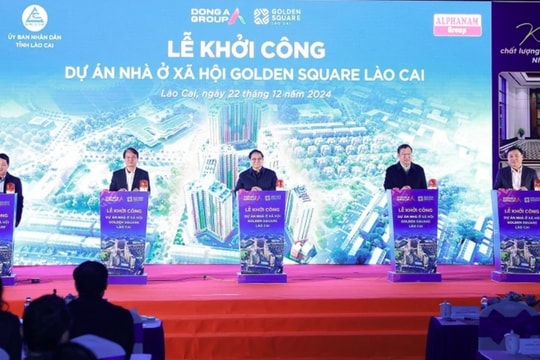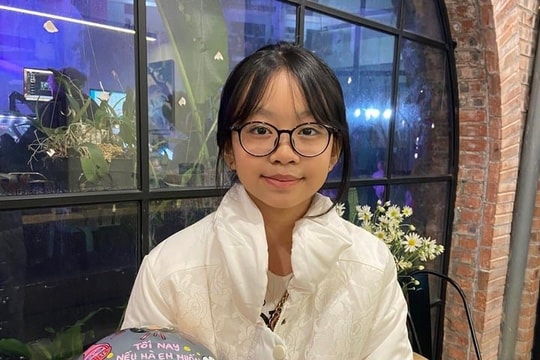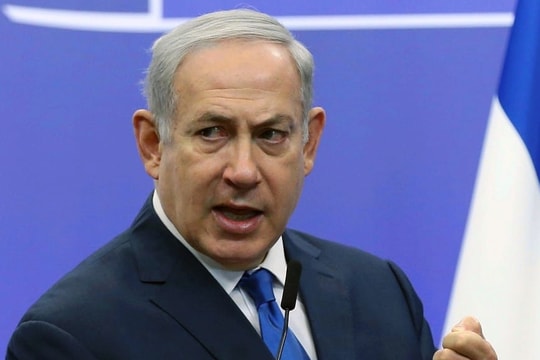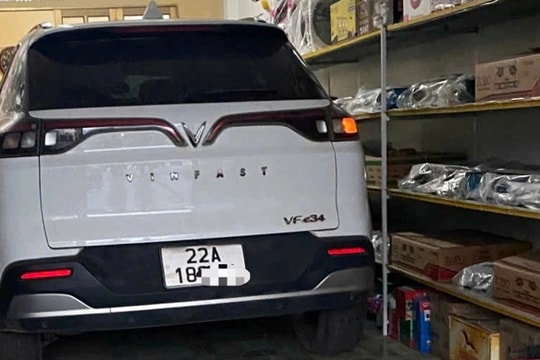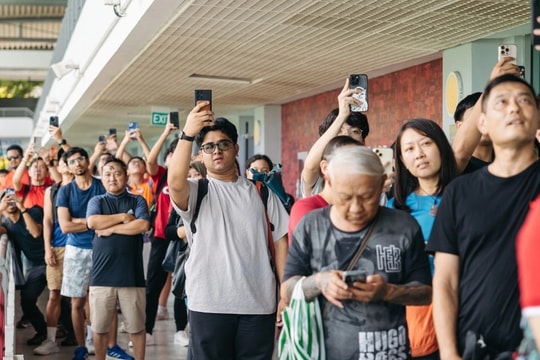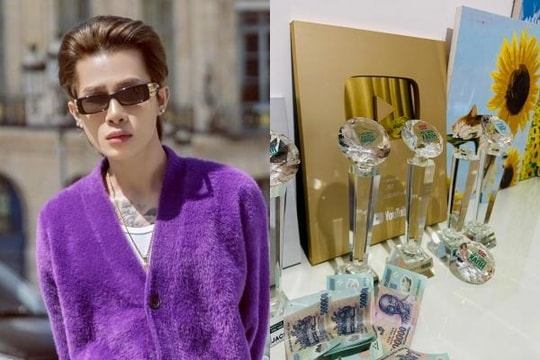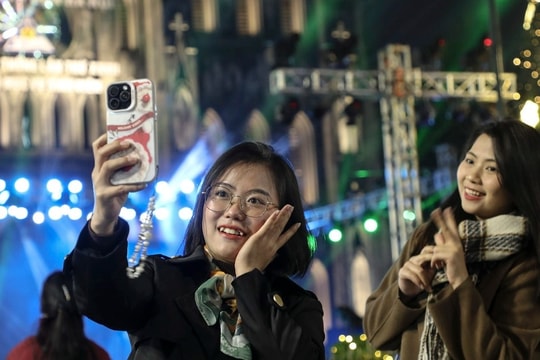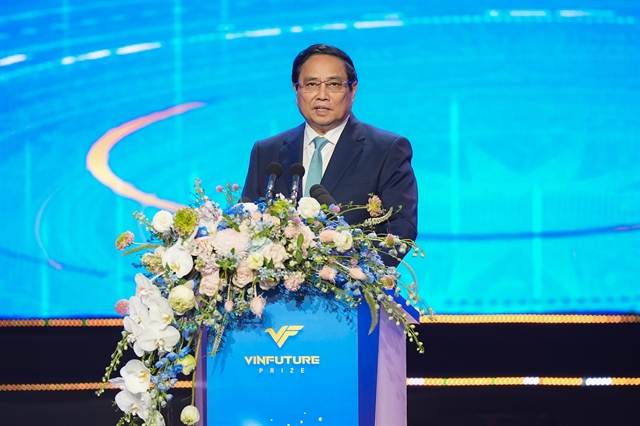 |
| Prime Minster Phạm Minh Chính speaks at the 2024 VinFuture Prize award ceremony in Hà Nội on December 6. — Photo courtesy of the organiser |
HÀ NỘI — The VinFuture Foundation honoured four scientific breakthroughs in 2024 at a ceremony in Hà Nội on December 6.
Speaking at the event, Prime Minster Phạm Minh Chính affirmed Việt Nam’s commitment to creating the most favourable conditions for scientists, science, technology and innovation to shine and develop strongly increasingly.
”Việt Nam always pays special attention to science, technology and innovation, considering this an objective requirement, a strategic choice, a top priority and a national policy to promote rapid and sustainable development in the new era - an era of prosperity and prosperity for the nation, as the Party General Secretary Tô Lâm has oriented,” stressed PM Chính.
The Prime Minister also hoped scientists, the business community, and domestic and international partners would continue to cooperate closely and support more effectively so that Việt Nam can continue to have breakthrough developments in improving scientific and technological capacity and innovation.
“With the spirit of "harmonious benefits, shared risks", Việt Nam always welcomes and encourages scientists, business communities and investors to realise ideas, opportunities and investment projects in Việt Nam,” added PM Chính.
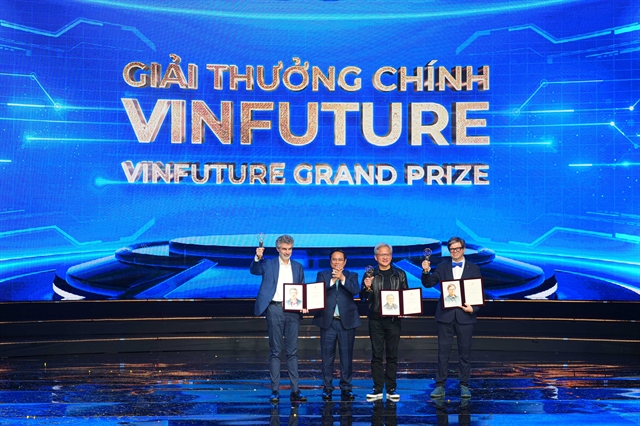 |
| Prime Minster Phạm Minh Chính presents the Grand Prize of the 2024 VinFuture Prize to five scientists, including Professor Yoshua Bengio, Professor Geoffrey E. Hinton, Mr. Jen-Hsun Huang, Professor Yann LeCun, and Professor Fei-Feil Li for transformational contributions to the advancement of deep learning. — Photo courtesy of the organiser |
The US$3 million Grand Prize of the 2024 VinFuture Prize, was awarded to five scientists, including Professor Yoshua Bengio, Professor Geoffrey E. Hinton, Mr. Jen-Hsun Huang, Professor Yann LeCun, and Professor Fei-Feil Li for transformational contributions to the advancement of deep learning.
Advances in deep learning have opened a transformative era for technological innovation, enabling machines to learn from vast amounts of data and achieve unprecedented accuracy in tasks such as image recognition, natural language processing, and decision-making.
Professors Geoff E. Hinton, Yann LeCun and Yoshua Bengio have made groundbreaking contributions to neural networks and deep learning algorithms, while Mr. Jen-Hsun Huang pioneered accelerated computing platforms that facilitated the modern era of AI computing.
Professor Fei-Fei Li’s creation of the ImageNet dataset further drove advances in visual recognition systems, making it possible to train models at scale.
Since 2012, deep learning has become a dominant tool in driving rapid advancements across sectors such as healthcare, autonomous systems, and financial services and shaping the future of innovation.
In addition to the VinFuture Grand Prize, three Special Prizes, each valued at $500,000, have been awarded to innovators with outstanding achievements in emerging fields, women innovators and innovators from developing countries.
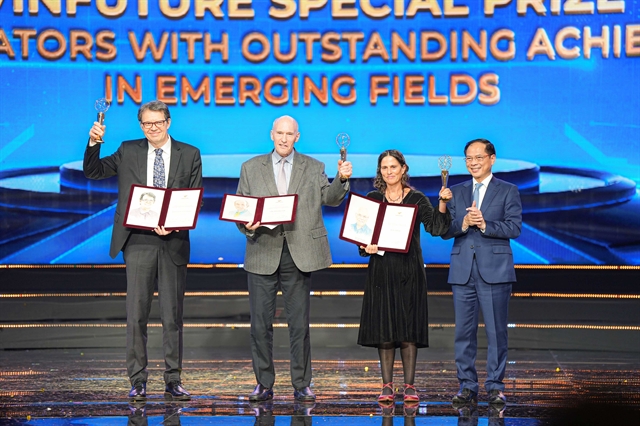 |
| Deputy PM and Minister of the Foreign Affairs Bùi Thanh Sơn presents the 2024 VinFuture Special Prize for Innovators with Outstanding Achievements in Emerging Fields to Professor Zelig Eshhar, Professor Carl H. June, and Professor Michel Sadelain for the development of CAR T cell therapy for cancer and other diseases. — Photo courtesy of the organiser |
The 2024 VinFuture Special Prize for Innovators with Outstanding Achievements in Emerging Fields is awarded to Professor Zelig Eshhar, Professor Carl H. June, and Professor Michel Sadelain for the development of CAR T cell therapy for cancer and other diseases.
Professor Zelig Eshhar's groundbreaking work transformed cancer treatment by developing CAR T cell therapy, a "living drug" that has saved many lives and sparked a thriving biopharmaceutical industry. This innovation offers hope for new medical applications and affordable treatments worldwide.
Professors Carl H. June and Michel Sadelain built on this progress, further improving CAR T cell therapy to effectively treat cancer and autoimmune diseases that resist standard therapies. Their pioneering work led to the approval of the first CAR T cell therapy by the US Food and Drug Administration in 2017 for childhood and young adult acute lymphocytic leukaemias and is now considered for clinical care worldwide.
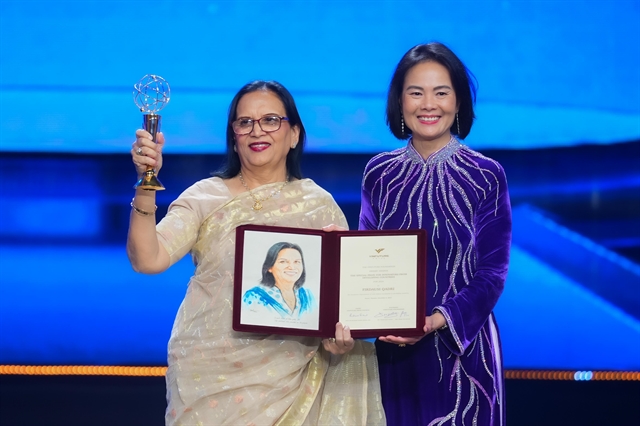 |
| Bangladeshi Dr. Firdausi Qadri receives the 2024 VinFuture Special Prize for Innovators from Developing Countries for the innovative improvement of oral cholera vaccination in developing countries.— Photo courtesy of the organiser |
The 2024 VinFuture Special Prize for Innovators from Developing Countries has honoured Bangladeshi Dr. Firdausi Qadri for the innovative improvement of oral cholera vaccination in developing countries.
Dr. Firdausi Qadri has played a key role in improving vaccination against cholera, a severe diarrheal disease due to the bacterium Vibrio cholerae, that occurs after ingestion of contaminated food or water and remains a major public health concern, particularly in areas with poor sanitation and limited access to clean water.
Dr. Firdausi Qadri at the International Center for Diarrheal Disease Research, Bangladesh has performed large-scale clinical studies with a Vietnamese live vaccine strain which allowed her to conclude on the benefit, power and safety of a single oral dose of an affordable vaccine and consequently on the possibility to perform large-scale vaccination campaigns in her own country and in other poor countries, to prevent outbreaks. Controlling cholera outbreaks at the source enhances global public health security, preventing the spread of the disease across borders.
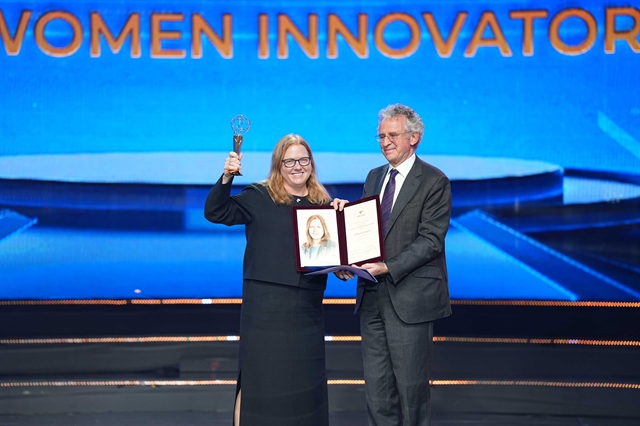 |
| Prof. Kristi S. Anseth receives the 2024 VinFuture Special Prize for Women Innovators for advancement in the design of polymeric biomaterials and methods for biomedical applications.— Photo courtesy of the organiser |
The 2024 VinFuture Special Prize for Women Innovators has honoured Prof. Kristi S. Anseth for advancement in the design of polymeric biomaterials and methods for biomedical applications.
Professor Kristi Anseth is a pioneer, who has developed biomaterial cell culture systems, to decipher extracellular matrix (ECM) signals that regulate tissue development, maintenance and regeneration. She designed a synthetic ECM that captures the unique cell and dynamic tissue microenvironment in three-dimensional space that can be modulated on demand, providing a means to study 4D-biology. She studies how cells exchange information with the ECM and applies this knowledge to engineer biomaterials for tissue regeneration and disease states, as well as screening drugs.
She is renowned for blending modern molecular and cellular biology with engineering and mathematics to produce the next generation of biomaterials that are tissue substitutes able to restore, maintain, or improve tissue function.
“The 2024 VinFuture Prize Laureates have all made advances that have changed the world, and have brought unexpected and powerful new tools. The Grand Prize recognises the unprecedented advances in Artificial intelligence. It celebrates three elements that together have propelled this success: fundamental advances in deep learning, data sets and the silicon GPU hardware. This year’s three Special Prizes celebrate advances in three very different areas of healthcare. These illustrate the breadth of science and technology that can bring practical and powerful solutions. The vision that the Founders set – to celebrate the potential for discovery and innovation to bring real benefits to societies across the whole globe – is very clearly delivered in the set of this year’s prize winners,” said professor Sir Richard Friend, FRS, VinFuture Prize Council Chair.
The four winning works were rigorously curated from a pool of nearly 1,500 impressive nominations spanning more than 80 countries and territories worldwide. These groundbreaking achievements have the potential to significantly impact humanity’s present and future, particularly in critical fields like computer science, public health and global health, material science, and generative medicine. Not only do these innovations offer solutions to universal challenges, but they also play a pivotal role in shaping the future of humanity. — VNS





